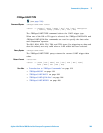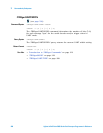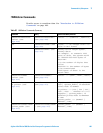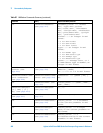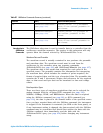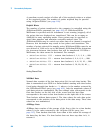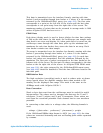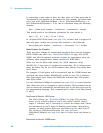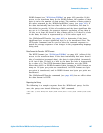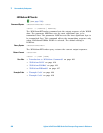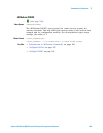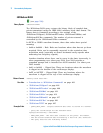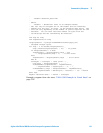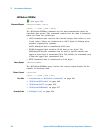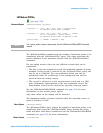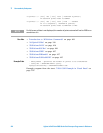Commands by Subsystem 3
Agilent InfiniiVision 5000 Series Oscilloscopes Programmer's Reference 407
WORD format (see ":WAVeform:FORMat" on page 412) provides 16- bit
access to the waveform data. In the WORD format, the number of data
bytes is twice the number of data points. The number of data points is
the value returned by the :WAVeform:POINts? query (see page 413). If
the data intrinsically has less than 16 bits of resolution, the data is
left-shifted to provide 16 bits of resolution and the least significant bits
are set to 0. Currently, the greatest intrinsic resolution of any data is
12 bits, so at least the lowest 4 bits of data will be 0. If there is a hole
in the data, the hole is represented by a 16 bit value equal to 0.
Use :WAVeform:BYTeorder (see page 408) to determine if the least
significant byte or most significant byte is to be transferred first. The
:BYTeorder command can be used to alter the transmit sequence to
match the storage sequence of an integer in the programming language
being used.
Data Format for Transfer - BYTE format
The BYTE format (see ":WAVeform:FORMat" on page 412 ) allows 8- bit
access to the waveform data. If the data intrinsically has more than 8
bits of resolution (averaged data), the data is right- shifted (truncated)
to fit into 8 bits. If there is a hole in the data, the hole is represented
by a value of 0. The BYTE- formatted data transfers over the GPIB
faster than ASCii or WORD- formatted data, because in ASCii format, as
many as 13 bytes per point are transferred, in BYTE format one byte
per point is transferred, and in WORD format two bytes per point are
transferred.
The :WAVeform:BYTeorder command (see page 408) has no effect when
the data format is BYTE.
Reporting the Setup
The following is a sample response from the :WAVeform? query. In this
case, the query was issued following a *RST command.
:WAV:UNS 1;VIEW MAIN;BYT MSBF;FORM BYTE;POIN +1000;SOUR CHAN1;SOUR:SUBS
NONE



